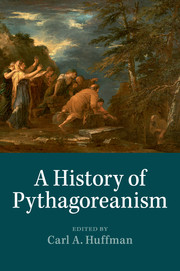Book contents
- Frontmatter
- Contents
- Contributors
- Abbreviations
- Introduction
- Chapter 1 Pythagoras
- Chapter 2 Philolaus
- Chapter 3 Archytas
- Chapter 4 Sixth-, fifth- and fourth-century Pythagoreans
- Chapter 5 The Pythagorean society and politics
- Chapter 6 The Pythagorean way of life and Pythagorean ethics
- Chapter 7 Pythagoreans, Orphism and Greek religion
- Chapter 8 The problem of Pythagorean mathematics
- Chapter 9 Pythagorean harmonics
- Chapter 10 The Pythagoreans and Plato
- Chapter 11 Aristotle on the “so-called Pythagoreans”: from lore to principles
- Chapter 12 Pythagoreanism in the Academic tradition: the Early Academy to Numenius
- Chapter 13 The Peripatetics on the Pythagoreans
- Chapter 14 Pythagoras in the historical tradition: from Herodotus to Diodorus Siculus
- Chapter 15 The pseudo-Pythagorean writings
- Chapter 16 Pythagoreans in Rome and Asia Minor around the turn of the common era
- Chapter 17 Diogenes Laertius’ Life of Pythagoras
- Chapter 18 Porphyry's Life of Pythagoras
- Chapter 19 Iamblichus’ On the Pythagorean Life in context
- Chapter 20 Pythagoras and Pythagoreanism in late antiquity and the Middle Ages
- Chapter 21 Pythagoras in the Early Renaissance
- Bibliography
- General index
- Index locorum
- Greek index
Chapter 1 - Pythagoras
Published online by Cambridge University Press: 05 May 2014
- Frontmatter
- Contents
- Contributors
- Abbreviations
- Introduction
- Chapter 1 Pythagoras
- Chapter 2 Philolaus
- Chapter 3 Archytas
- Chapter 4 Sixth-, fifth- and fourth-century Pythagoreans
- Chapter 5 The Pythagorean society and politics
- Chapter 6 The Pythagorean way of life and Pythagorean ethics
- Chapter 7 Pythagoreans, Orphism and Greek religion
- Chapter 8 The problem of Pythagorean mathematics
- Chapter 9 Pythagorean harmonics
- Chapter 10 The Pythagoreans and Plato
- Chapter 11 Aristotle on the “so-called Pythagoreans”: from lore to principles
- Chapter 12 Pythagoreanism in the Academic tradition: the Early Academy to Numenius
- Chapter 13 The Peripatetics on the Pythagoreans
- Chapter 14 Pythagoras in the historical tradition: from Herodotus to Diodorus Siculus
- Chapter 15 The pseudo-Pythagorean writings
- Chapter 16 Pythagoreans in Rome and Asia Minor around the turn of the common era
- Chapter 17 Diogenes Laertius’ Life of Pythagoras
- Chapter 18 Porphyry's Life of Pythagoras
- Chapter 19 Iamblichus’ On the Pythagorean Life in context
- Chapter 20 Pythagoras and Pythagoreanism in late antiquity and the Middle Ages
- Chapter 21 Pythagoras in the Early Renaissance
- Bibliography
- General index
- Index locorum
- Greek index
Summary
Introduction
More even perhaps than Heraclitus – for whom we have at least a few well-attested original statements – Pythagoras eludes interpretation. How can we distinguish reliable from unreliable testimonies? Are there any fully trustworthy sources in the first place? Some scholars place their faith in the earliest, pre-Platonic, evidence, but how that is to be taken has been interpreted very differently. The evidence for Pythagoras in Aristotle's lost work on the Pythagoreans is problematic, and what he has to say about him in the extant treatises amounts to very little. Twentieth-century scholarship was very dismissive of the far richer accounts of Pythagoras and the Pythagoreans in much later Neopythagorean or Neoplatonic writers who were accused, with some justification, of inventing a picture of Pythagoras who could be cited as authority for their own fantastic doctrines. Yet without a clear basis on which to judge how fantastic Pythagoras’ own teachings may have been, it is obviously difficult to decide how far later sources may have distorted them. When every ancient and every modern interpretation suffers from large doses of the speculative, the desperate conclusion seems to loom – that the real Pythagoras is now more or less totally inaccessible.
A recurrent problem relates to the use of modern categories, even when some of these have ancient precursors. Should Pythagoras be considered a mystic, a sage, a religious leader, a charismatic figure, a guru, a magus or magician, a wonder-worker, a shaman, a philosopher, a cosmologist, a mathematician, a scientist? The scholarly literature is full of attempts to shoehorn him into one or other, or more often into a combination of such categories. We shall find reason to be cautious about the usefulness of all of these labels.
- Type
- Chapter
- Information
- A History of Pythagoreanism , pp. 24 - 45Publisher: Cambridge University PressPrint publication year: 2014
- 28
- Cited by



